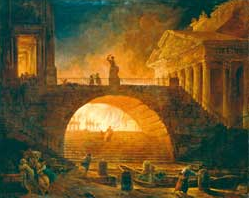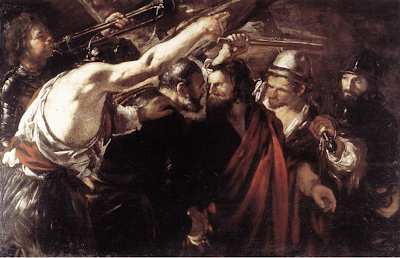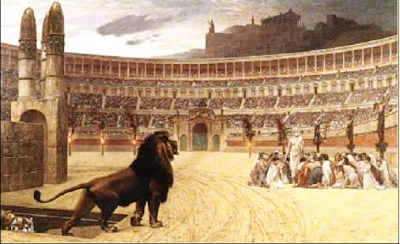TODAY’S SPECIAL: I Peter 1:3-9
TO CHEW ON: "These (trials) have come so that the proven genuineness of your faith—of greater worth than gold, which perishes even though refined by fire—may result in praise, glory and honor when Jesus Christ is revealed.." I Peter 1:7
The year was 64 A.D. One night the sky above Rome glowed bright long after the sun had set. Soon the air was thick with smoke. The streets filled with panicky people crying, “Help! Fire! The city is burning!”

But at the emperor’s palace Nero laughed at the dancing flames. Then legend tells us that he took his fiddle and began to play.
“Who set the fire?” the people asked later. Many thought Nero, who liked to build things, set it himself so he could build Rome over again. Nero blamed the Christians.
Immediately soldiers arrested many. They wrapped some in animal skins and threw them into the arena where they were torn by dogs or eaten by wild animals in front of cheering crowds. They tied some to poles in Nero’s garden, poured tar over them, and burned them alive. It was during this time that the Apostle Paul was killed.

Two years after the fire of Rome (66 A.D.), Jesus’ disciple Peter wrote the letter 1 Peter. He wrote this letter to scared Christians living outside Rome. They were being persecuted too. He didn’t tell these Christians they wouldn’t have trials or persecution.

Rather, Peter told his readers that their trials had a purpose. What was it (1 Peter 1:7)?
These trials have come so that your faith may be proved _______________ and may result in _____________, _______________ and _____________ when Jesus Christ is revealed.
It is the same for us today. We may not have an easy life. In some places, it is illegal to be a Christian. People are threatened, hurt, even killed for believing in Jesus. But people who endure persecution in this life will get praise, glory and honor when they meet Jesus.
PRAYER: Dear Jesus, I pray my faith would also be proved genuine (the real thing) through trials that come my way. Amen.
MORE: The Early Church
Look in books, encyclopedias, or on the internet to find out more about the early church.
1. Where did they meet?
2. What day did they meet together?
3. What things did they do when they got together?
4. What happened as a result of persecution?
5. What were catacombs? What part did they play in the early church?